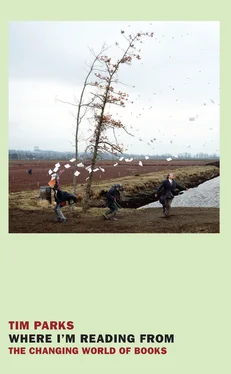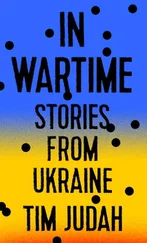For the American reader, there is the pleasure of recognizing the interiors Franzen so meticulously describes, while the English reader can just about hang on with all he has learned from films and TV. Not so for the Italian, or German, or Frenchman, who simply struggles through lists of alien bric-a-brac. We might say that if the Swiss Stamm, to attract an international public, has been obliged to write about everyman for everyone everywhere, Franzen, thanks to the size of America’s internal market, but also to the huge pull the country exercises on the world’s imagination, can write about Americans for Americans (which is no doubt as it should be) and nevertheless expect to be read worldwide.
Aside from the recognition factor—this is America—are there other pleasures to be had from Franzen, pleasures available to the foreigner reading in translation? I knew before opening it, of course, that Freedom was “an important novel” if only because The Guardian had dedicated to it an article on its homepage (on which my browser opens). Even before he had read the book, the Guardian writer remarked that Franzen was probably the only novelist alive able to revive our belief in the literary novel. Traveling in Holland the week the English edition was published, I saw that Amsterdam’s main international bookshop had dedicated their entire window to it.
At a loss to understand this enthusiasm (I found the novel hard going), I checked out The New York Times Book Review where Sam Tanenhaus canonizes the novel in his first sentence; it is “a masterpiece of American fiction.” Interesting here is the word American . To be a masterpiece of American fiction is to have hit the top. “A masterpiece of Swiss fiction” does not have the same ring, and if, say, a work by Pamuk is declared a masterpiece it will not be “a masterpiece of Turkish fiction.” Tanenhaus then quickly explains Franzen’s achievement, which is to gather up “every fresh datum of our shared millennial life.” He goes on:
Franzen knows that college freshmen are today called “first years,” like tender shoots in an overplanted garden; that a high-minded mom, however ruthless in her judgments of her neighbors’ ethical lapses, will condemn them with no epithet harsher than “weird”; that reckless drivers who barrel across lanes are “almost always youngish men for whom the use of blinkers was apparently an affront to their masculinity.”
Is it really such an achievement to know that “freshmen” are called “first years” (as in most places in the world for that matter)? The plot is described as “intricately ordered” and Franzen’s one prominent formal device (having the main character Patty relate much of the book as a third-person autobiography on the prompting of her therapist) as “ingenious.” Neither is true. The plot is a complete pig’s ear—to use a very English if not American expression—and is best grasped by checking out John Crace’s hilarious “Digested read,” again in The Guardian . As for the voice, the supposedly unsophisticated jock, Patty, turns out to have a style that is undistinguishable from that of the extremely sophisticated Franzen; it is never clear what the story gains from pretending that she is telling it. On the contrary, the move undermines the novel’s credibility.
But Freedom ’s failings are interesting in so far as they deepen the mystery of the book’s international success. It’s one thing for the Americans to hype and canonize one of their favorite authors, but why do the Europeans buy into it? Ever anxious that they need to understand America, fascinated by its glamour and power, Europeans are perhaps attracted to those American novels that explain everything: Roth’s American Pastoral , DeLillo’s Underworld . More than a novel by an American, they want The Great American Novel. But of course Europeans also resent American world hegemony and feel (still and no doubt wrongly) superior culturally.
Freedom has this characteristic: Franzen appears to get all his energy, all his identity, from simultaneously evoking and disdaining America, explaining it (its gaucheness mostly) and rejecting it; his stories invariably offer characters engaging in the American world, finding themselves tainted and debased by it, then at last coming to their Franzenesque “corrected” senses and withdrawing from it. Blinded by this or that ambition, they come to grief because they lack knowledge, they lack awareness. Thus the importance of so much information. Unlike his characters, Franzen knows everything, is aware of everything, and aware above all that redemption lies in withdrawal from the American public scene. What message could be more welcome to Europeans? A friend writes to me from Berlin and remarks, “Here in Germany, Franzen’s the only American novelist people talk about.” That is, Franzen is establishing a picture of a dysfunctional America that Europeans feel happy with. With Franzen they can “do” America and have done with it.
IS ENGLISH, AND specifically American English, destined to take over the world?
The recent acceleration in communications and the process we’ve grown used to calling globalization have renewed an old debate about the relationship between lingua franca and vernacular. The nations of the European mainland are constantly anxious that the adoption of English words and even syntactical structures may be seriously reshaping their languages. Meanwhile, in many technical fields, scientific papers are now written almost exclusively in English, with the result that certain concepts become difficult to express in the local vernacular since no one is at work developing a vocabulary for them.
Back in 2000, in an intriguing article titled “Cosmopolitan and Vernacular in History,” Sheldon Pollock discussed the possible ways a lingua franca can relate to different vernaculars by comparing the fortunes of Latin and other languages in the Roman Empire with those of Sanskrit and local languages in India and the East during the same period (roughly from the beginning of the first millennium to its end). His general claim is that while in the West Latin was ruthlessly imposed on the back of Roman military conquest and tended to obliterate the languages of peoples subdued, in the East there was a more relaxed coexistence between the cosmopolitan lingua franca and the surrounding vernaculars, Sanskrit gaining a general currency more through trade and a desire to be widely understood than through military conquest or political coercion.
The burden of Pollock’s article is clear enough: that we needn’t think about the spread of English as necessarily in conflict with the world’s vernaculars; he wants us to avoid thinking in terms of “either/or” and work toward a relationship that is “both/and.” The advice is good, and more than a dozen years later the article is as intriguing as ever, though perhaps what struck me most on a recent rereading was the contemporaneous nature of these linguistic experiences in East and West: both saw the rise and decline of a lingua franca at more or less the same time, suggesting the working out of an underlying process and the manifestation of a collective will.
But reading about translation and international literature, reading novels in translation from many nations, and also reading the work of graduate students of translation and creative writing, I have gathered the impression that we are heading for a new and rather different resolution of the tension between lingua franca and vernacular. While easily conceding that certain areas of highly specialized knowledge become the exclusive domain of English, most people are not so willing, nor able, to read novels, or indeed any prose that involves strong elements of style, in a foreign language. There they want to keep to their mother tongue. Nor are many creative writers able and willing to follow in the footsteps of a Conrad or Nabokov, or more recently the many Asian and Indian writers who have switched from their native tongues to more marketable English. Most writers want to go on writing in their own languages.
Читать дальше












